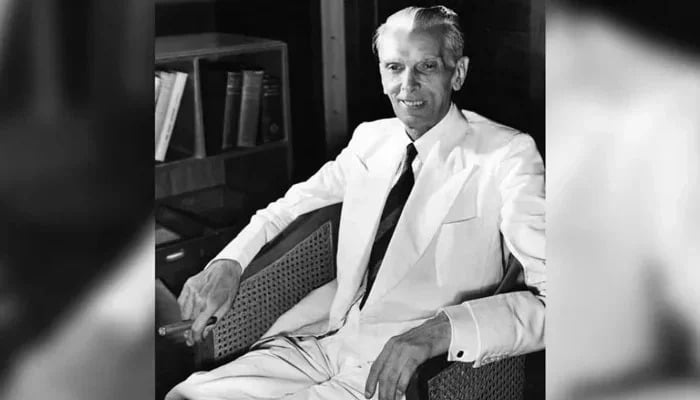The everyday Jinnah
Quaid-i-Azam is not just a title or name of a person; it is synonymous with freedom, independence, and heroism

‘There are only two ways of learning in life,’ said Jinnah to his son Mohammed Ali. ‘What are they, father?’ he replied. ‘One is to trust the wisdom of your elders and their superior knowledge, to accept their advice and do exactly as they suggest.’ ‘And what is the other way, father?’ ‘The other way is to go your own way, to learn by making mistakes, to learn by hard knocks and kicks in life.’ Till the very last day of his life, Quaid-i-Azam Mohammed Ali Jinnah, the founder of Pakistan, always took his own way.
Quaid-i-Azam is not just a title or the name of a person; it is synonymous with freedom, independence, and heroism. The life of a hero is marked by events that embody the essence of independence and self-realisation. A hero’s journey can be described as a monomyth, a cyclical pattern where the hero embarks on an adventure, crosses the threshold from the ordinary world, faces and overcomes crises, and returns transformed, carrying the elixir that can heal or save his people. In the monomyth of Quaid-i-Azam, freedom and independence rest at the core; they are the very heartbeat of his journey.
Jinnah’s lineage, too, hinted at an inherent defiance of norms. His father, Jinnahbhai Poonja, was born in 1857, the year of the Indian Rebellion, and later chose to leave his ancestral village of Paneli to seek broader horizons in Gondal and eventually Karachi. This daring spirit was inherited by Quaid-i-Azam, who would later go on to break the wheel of colonial dominance and give birth to a new nation. Born weak and frail on a Sunday in Kharadar, Karachi, Jinnah’s survival itself was a quiet testament to his resilience. Defying early doubts about his health, he not only thrived but went on to embody a personality that consistently surpassed expectations.
The early years of Quaid-i-Azam’s life marked the beginning of his hero’s journey. Like an ordinary child, he enjoyed playing games and winning in them, establishing himself as a leader among his friends. At six, he began his education with Gujarati lessons at home, although he showed little interest in reading and preferred games instead. At nine, school posed an unexpected challenge for him. Finding himself outperformed by other students, Quaid-i-Azam chose an unconventional route; he quit school, preferring to accompany his father to work instead. Yet, his stint at the office taught him a humbling lesson: without education, he commanded little respect.
Back at school, Jinnah displayed newfound dedication, attending Sind Madrasahtul-Islam, a high school on Newnham Road. Despite occasional shifts between schools, likely a reflection of his restless and perfectionist spirit, he persisted and paved way for his future accomplishments. By the age of 10, Jinnah had developed a passion for horseback riding, a sport that brought him immense joy. Accompanied by his school friend Karim Kassim, the two boys would ride for miles, finding in nature the inspiration for his philosophy of life. To Quaid-i-Azam, the verticality of trees, flowers, domes, and even human posture symbolised aspiration and dignity. This observation cemented his resolve to always look ahead and carry himself with pride.
At around fifteen, Quaid-i-Azam faced instability in his life, marking the crisis phase of his monomyth. True to his character of independence and defiance of norms, he confronted challenges directly. After marrying Emi Bai in Paneli, he broke a village tradition by convincing her parents to let her accompany him to Karachi, bypassing the customary one-month stay with her family.
Soo after, the General Manager of Grahams Trading Co., an Englishman and close friend of Quaid-i-Azam’s father, offered him a chance to join their Head Office in London as an apprentice for three years, where he could learn practical business administration. He left for London in a ship. During the voyage, when warned about pickpockets in Port Said, Quaid-i-Azam took it as a challenge to his sense of responsibility and confidently explored the streets of Port Said alone.
Once in London, Quaid-i-Azam worked at Grahams Trading Co., braving cold, heavy rains every day. While working, he immersed himself in the British liberal environment. He developed a habit of reading the morning paper before finishing his breakfast. He admired the achievements of British leaders, whose speeches were followed with great reverence by the people. He often found himself questioning his own purpose; yes, money was important, but he realised he could never be a leader or a hero for the betterment of his countrymen if he stayed on this path.
Inspired by the English leaders, Quaid-i-Azam saw that many of them had studied law. True to his nature, he broke free from the obligation to work at Grahams and decided to pursue the Bar. Though deeply immersed in English culture, Quaid-i-Azam always remained a Muslim at heart. He chose to join Lincoln’s Inn, not just for its academic reputation but also because he saw the name of the Prophet (PBUH) engraved on its entrance alongside the greatest law-givers in history.
Despite facing personal and financial challenges, including the death of Emi Bai, and his mother, and the severe losses in his father’s business, Quaid-i-Azam managed to pass the Bar. During his time at Lincoln’s Inn, he expanded his intellectual horizons, obtaining a reader’s ticket to the British Museum and engaging in extensive reading.
He often spent Sundays at Hyde Park Corner, where soap-box orators inspired him with their ability to captivate audiences despite lacking formal education. He also frequented the House of Commons, closely observing the parliamentary eloquence of figures like Mr. Gladstone, Lord Morley, Mr. Joseph Chamberlain, Mr. Balfour, and Irish patriot Mr. T.P. O’Connor, skills he would later emulate with great success. During his time in London, he also actively campaigned for Dadabhoy Naoroji.
Quaid-i-Azam led a full life, balancing his studies for the Bar, managing finances, engaging in politics, and caring for his family. Amidst these responsibilities, he cultivated a deep interest in literature, particularly Shakespeare, whose works he enjoyed throughout his life. Though he dreamed of acting, especially playing Romeo at the Old Vic, he redirected his ambition toward being a hero on a larger stage, leading millions.
His return to Karachi marked the final phase of his monomyth, where he would leave a lasting impact on the world. After relocating to Bombay, Quaid-i-Azam faced early struggles in his career, unable to secure a single brief as a barrister. Despite this, he remained composed, walking the courts daily without income, while internally battling frustration. His social connections eventually led him to a position as a Presidency Magistrate. His performance earned him praise, and when his temporary appointment ended, Sir Charles Ollivant offered him a permanent judicial position with a significant salary. But Quaid-i-Azam declined, confident that he would soon earn more in a single day. His refusal exemplified his independence and ambition, traits noted by Sir Chimanlal Setalvad, “Jinnah had always, even in his junior days, shown considerable independence and courage. He never allowed himself to be overborne either by the judge or the opposing Counsel.” His family had settled in Bombay, and Quaid-i-Azam made it a point to visit them every Sunday in Khoja Mohallah.
From then on, Quaid-i-Azam became a pioneering leader for the Muslim struggle in India, never allowing his declining health to slow him down. His capacity to sleep at will helped him manage the exhaustion from his tireless work. Despite physical discomfort, he continued his efforts, saying, “Have you ever heard of a general taking a holiday when his army is fighting for its survival?” Even when bedridden, he would rise to speak, knowing that the Muslims drew their strength from him.
His chauffeur, Mohammad Hanif Azad, noted that Quaid-i-Azam had a fondness for good shoes and owned many pairs. He also enjoyed playing billiards, though often alone. “He would take a cue in his hand, survey the balls carefully, fondly rub his fingers on the cue, and then take his shot. He would be so happy when he scored.”
Quaid-i-Azam was a heavy smoker, consuming about fifty cigarettes daily. He felt very happy when hosting parties at his home, where he would order special dishes to ensure his guests had plenty to enjoy. For a change, he would sometimes go to the Taj Hotel for a meal, as he liked to eat there. Despite a lifelong aversion to doctors and medicine, he defied his deteriorating health, insisting on continuing his work. His determination was evident as, at times, he would go to bed in his clothes and shoes on after attending events. On one occasion, when a lady compounder was called to check his temperature, she refused to tell him the reading. Quaid-i-Azam admired her firmness, saying, “I like people who can be firm and refuse to be cowered down.”
Quaid-i-Azam had a love for roses, particularly carnations, and preferred to keep them in his surroundings. At night, he wore silk pajamas, a lifelong habit, despite often shivering with cold. His mind remained focused on the country’s issues, even when his body was weakening. His thoughts were consumed by Pakistan, Kashmir, refugees, and the constitution. Every day at Ziarat, a table and chair were laid for him in the lawn, and he used to work. It was only a few days before his departure that he stopped working. Saleh Mohammad, his gardener at Ziarat, also recalled that Quaid-i-Azam would walk along the road that led from the Residency to the swimming pool, a distance of about two furlongs.
When advised to move to Karachi for treatment, he agreed, saying, “I was born there… I want to be buried there.” When it was time to leave, he refused to travel in a pajama suit, insisting on dressing properly as he always had. In his final moments, as his health worsened, he expressed his readiness to depart, stating, “No, I am not,” when told that he would be okay and live.
Quaid-i-Azam, the hero of our nation, lived a life that continues to advocate for freedom and independence. His life stands as a testament to the unwavering pursuit of freedom, not just in the political sense, but in freeing the heart, mind, and soul. The Quaid-i-Azam had a singular goal, and he relentlessly sought freedom from every obstacle that stood in his way. His life teaches us countless lessons, with the most significant being the importance of confronting difficulties head-on. It is through overcoming these challenges that a hero is forged. Much like a caterpillar struggling within a cocoon, unaware that the effort is vital to its transformation into a butterfly, we too must embrace our struggles. Without them, we would not realise our true potential. As we remember Quaid-i-Azam, it is important for us to reflect on our own lives. Are we striving to be free? Are we pursuing independence in all its forms, as he did?
Disclaimer: The viewpoints expressed in this piece are the writer’s own and don’t necessarily reflect Geo.tv’s editorial policy.
Originally published in The News







